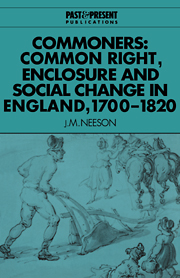Book contents
- Frontmatter
- Contents
- List of tables
- Preface
- Introduction
- 1 The question of value
- I SURVIVAL
- II DECLINE
- III CONCLUSION
- 10 ‘Making freeman of the slave’
- Appendix A Using the Land Tax
- Appendix B Acreage equivalents
- Appendix C Correcting and editing the Land Tax
- Appendix D Landholding estimates
- Bibliography
- Index
- Past and Present Publications
10 - ‘Making freeman of the slave’
Published online by Cambridge University Press: 01 February 2010
- Frontmatter
- Contents
- List of tables
- Preface
- Introduction
- 1 The question of value
- I SURVIVAL
- II DECLINE
- III CONCLUSION
- 10 ‘Making freeman of the slave’
- Appendix A Using the Land Tax
- Appendix B Acreage equivalents
- Appendix C Correcting and editing the Land Tax
- Appendix D Landholding estimates
- Bibliography
- Index
- Past and Present Publications
Summary
Im swordy well a piece of land
Thats fell upon the town
Who worked me till I couldnt stand
& crush me now Im down
There was a time my bit of ground
Made freeman of the slave
The ass no pindard dare to pound
When I his supper gave
The gipseys camp was not affraid
I made his dwelling free
Till vile enclosure came & made
A parish slave of me
Alas dependance thou'rt a brute
Want only understands
His feelings wither branch & root
That falls in parish hands
From John Clare ‘The Lament of Swordy Well’, c.1822Commoners were not labourers. Their defenders and critics agreed on this. Some laboured, some earned wages, but even they were independent of the wage. Their lands and common rights gave them a way of life quite unlike that of the agricultural labourers, outworkers or smallholders they might become at enclosure. Defining exactly what commoners were is difficult but it is important. They were peasants. I call them that reluctantly, but necessarily. The value of the name is that it emphasizes a continuity with the past, a continuity based on the occupancy of land and rights in the common-field system.
There are other words. As an alternative to peasant I could call commoners ‘cottagers’ as some contemporaries did. But in common-right terms ‘cottager’ has a very specific meaning; to use it here would be to exclude many commoners who were not cottagers. Moreover, for all that Gregory King used it in 1688 to describe the very poor, cottager has a late eighteenth- and early nineteenthcentury ring to it.
- Type
- Chapter
- Information
- CommonersCommon Right, Enclosure and Social Change in England, 1700–1820, pp. 297 - 330Publisher: Cambridge University PressPrint publication year: 1993

